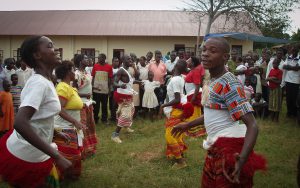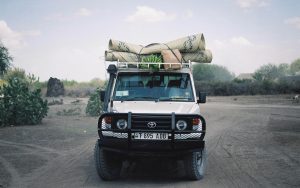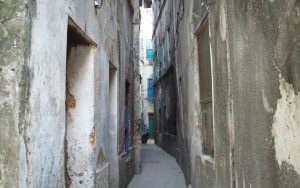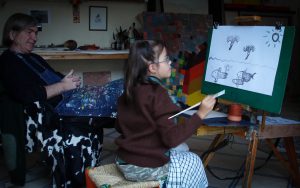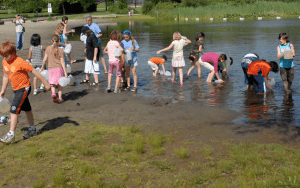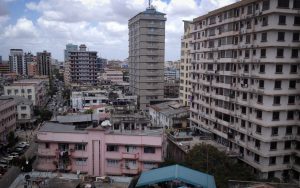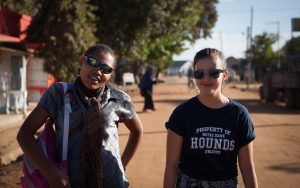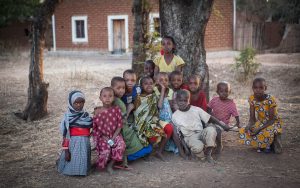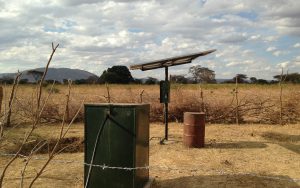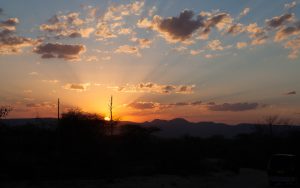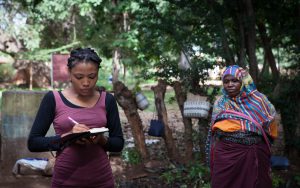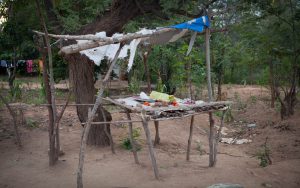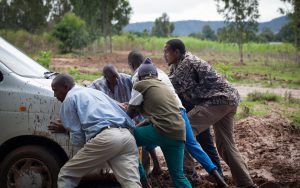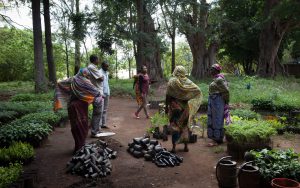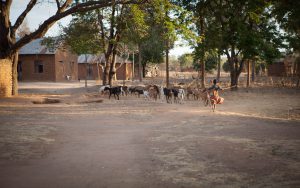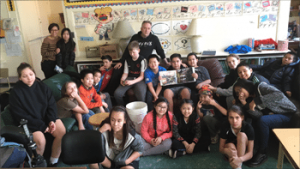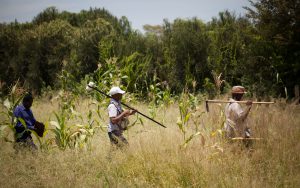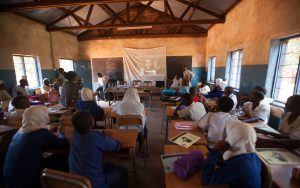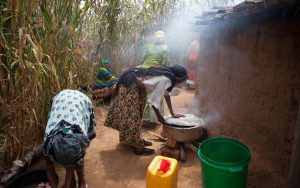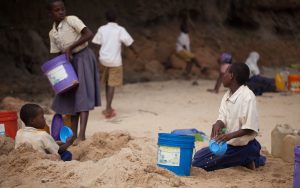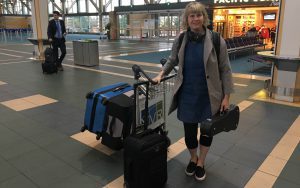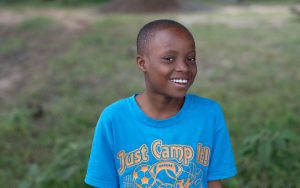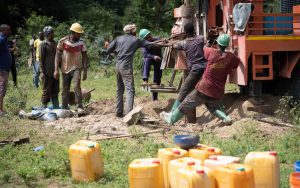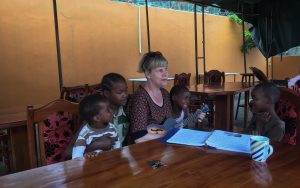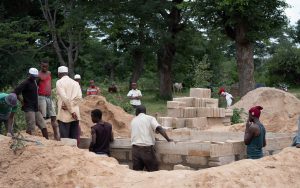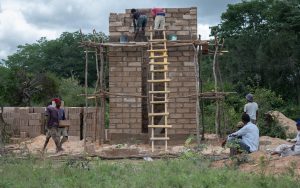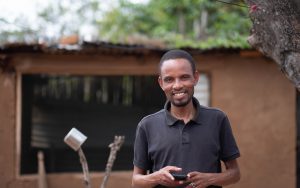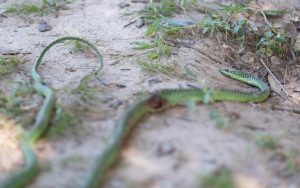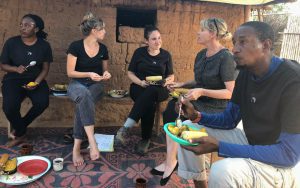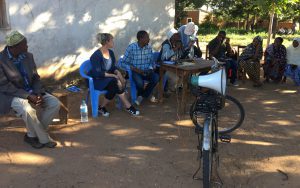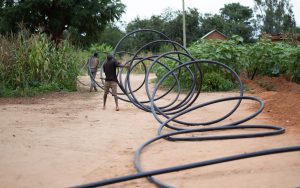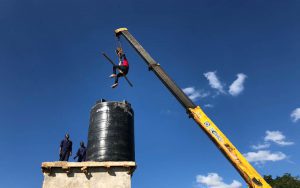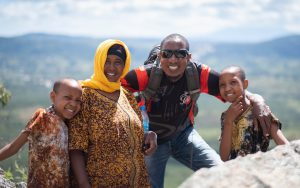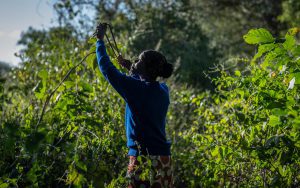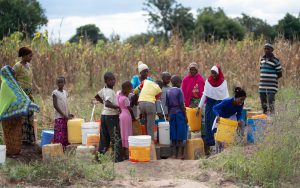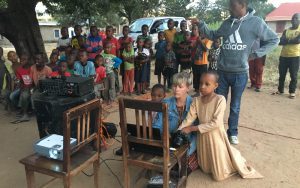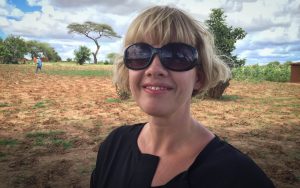The projects led us to many of the surrounding Irangi villages, and over a two week period, we visited Kalema, Kigali, Kolo, and Iyoli. Our ultimate destination was, of course, Cheku, but we were biding our time before heading there because we had sent the pump out for maintenance. Sand had gotten into it and it needed to be cleaned and then recalibrated.
In each village, we were introduced to the chief, the women’s groups, and the larger community. The chief would greet us, and then we would walk, often to a small office in the center of the village, to sign the village guest book. This was typically an old notebook that had yellowed from the passage of time. I would often flip back through the pages to see who else had visited. There weren’t many names, but you would see a smattering of countries, England especially. These were all the tourists that Moshi had brought into the villages as part of his cultural tours.
From there, we would go to a hut where the women and girls smeared a green mixture of goat remains, spit, and bark to our foreheads. They did this to all visitors—or someone who has been away for a long time—as a greeting of peace. Then we were officially welcomed into the village and could begin talking about the reasons we came. This process often took over two hours.
In each village. For each project. Things moved slowly.
We were working on four separate projects: a tree project, a chicken project, a bee project, and sack gardens, which—much as the name implies—involves filling a sack with soil and growing plants that way. This a great way to allow families to grow food at home without the need of a full garden in the hard-packed earth.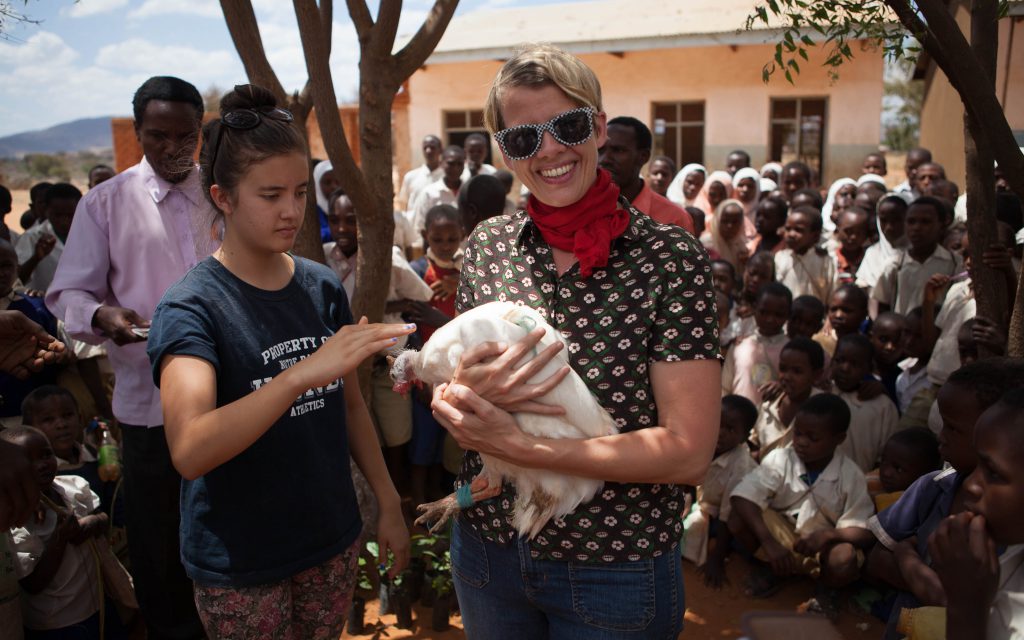
In Kalema, the first village we visited, five women from the collective greeted us, and then we ate ugali and mashed okra on the floor with our fingers, the Tanzanian way.
Young and old women dressed in traditional muslim headdresses swarmed us and threw water and salt all around us. They even splashed it on the car. I found out later that they do this with all new visitors, and they are welcoming us and blessing us in their community. The women also put white necklaces around our necks that signified being safe and having a safe journey. After the greeting, we sat down and had lunch. The main thing people eat here is ugali, and all food is eaten with hands and you’re meant to get really dirty. I like it because using my hands is so much more fun than utensils.
The women in Kalema had already started a small business of making clay pots and selling them at the local market.
After lunch, we sat down and the women taught us how to make pottery. It is crazy how hard it is for them. First, they have to find the clay from the mountains. Once they find enough and carry it all the way back home, they have to crush the soil into small enough pieces to grind. The grinding is the hardest part. First, you put the soil on a flat surface and cover it with dirt. Then you have to take a rock and push down with a lot of force. The next step is to add water to the paste and start moulding. Then you put the pots out to dry for a day, and finally, you put them under a hot fire until they turn a reddish brown colour. Me and Lara tried the grinding and moulding part, which was fun for a bit, but got boring and repetitive. Making clay pots is usually only done by women and the pots are generally used for cooking.
The women also wanted to start selling chickens at the local market. Most people already had chickens—they were everywhere—but those chickens were all meant for meals for special guests as a sign of respect. Moshi called them culture chickens, and they weren’t sold—none of them. Moshi wanted to show them how they could earn money to put in a bank account. I loved the idea of a culture chicken but, as an entrepreneur, I could not wrap my head around such an obvious opportunity, but then again, capitalism doesn’t exist as we know it around the world.
They had built a community coop in preparation, so I bought some chickens, and then made Zoe run around and catch them.
I tried to catch the chickens for the women’s group. Chickens are actually really scary because they cluck loudly, flap their wings violently, and peck at you.
We spent a few days at different elementary schools demonstrating how sack gardens could be easily planted at home.
Richard went to the schools and taught the kids how to grow food using special techniques in this dry environment. One of the techniques was making a sack garden that used rocks in the centre, which makes water go right to the bottom. After the initial growing phase, it only takes a cup of water to grow.
Another village, Iyoli, was focusing on building a sustainable beehive project. Honey bee harvesting contributed to deforestation. To build a traditional hive that was only used once, people had to cut down a tree and use its wood and bark. We were introducing bee boxes that were made from a sustainable tree farm. These boxes could be used repeatedly across many years, and because they were built with multiple screens and deeper boxes, it could at least triple honey production.
We would be staying the night, but first, we ventured into the bush to find the old hives that had been put in the trees a year ago and were ready to be harvested. Honey harvesting happened in the dead of night because killer bees couldn’t see well in the dark, and because we stood downwind, they couldn’t smell us, either. Along with six other people, we walked with the light of the full moon to a giant old baobab tree.
Two guys tied a rock to one end of a rope and threw it over a branch so that they could shimmy up the tree and cut the hive down. It hit the ground, and they took a torch and smoked out the bees. Then they cut open the hive to get at the fresh honeycombs. During this entire process, the bees were stinging them, but their bodies had built up an immunity. While we watched, however, we could only hope that Moshi’s confidence in our safety was true.
The men cut the honeycombs open and handed them to us, and we sucked the sweet liquid right out while the stars shined down on us and bees buzzed off in the distance.
Our bee adventure had been exhausting, so we—including our translator Yasinta—went back to our mud hut and slept on clay beds with a mosquito net covering our bodies.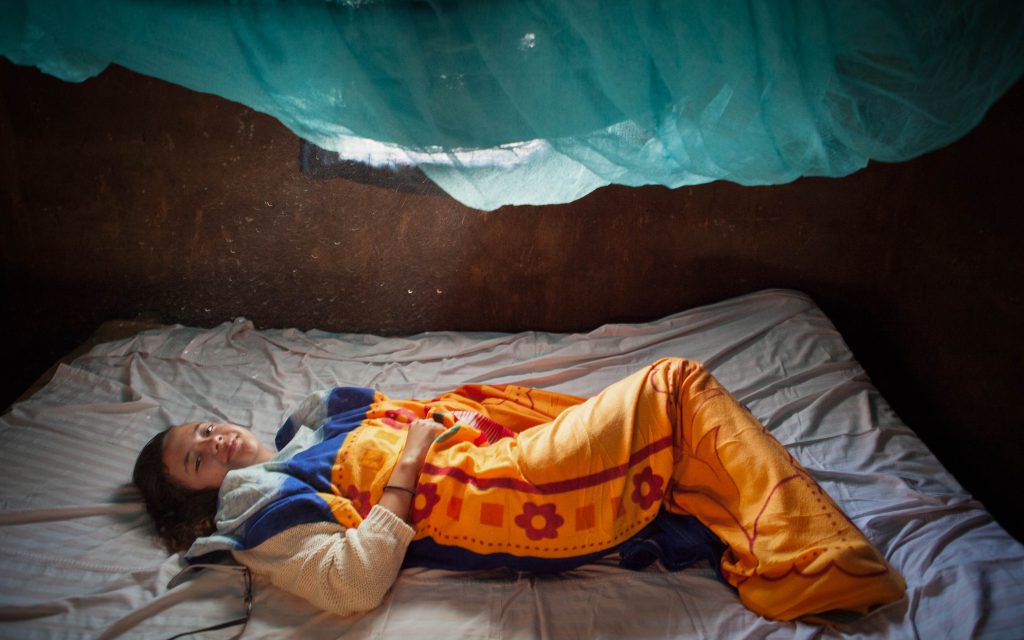
We slept in one of the clay houses which was pitch black at night. I slept by the window so I heard all the different animal sounds throughout the night. At one point, I’m pretty sure a bird flew into my bed and landed on my head! Next morning, we surprisingly felt really good and brushed our teeth and washed our faces over a small bucket with homemade soap. Waking up to squat toilets and cold showers feels kind of normal now. We ate breakfast, which was deep fried bread and tea. After breakfast, we went out to the bush.
Ten of us piled into a minivan, and we headed out to visit one of Moshi’s Barabaig friends in the bush. The Barabaig tribe are pastoralists, and they spend their days tending to their herds of cattle. They rely entirely on the environment for all their needs, including food, shelter, and medicine.
The driver decided that he could not go any further on the roads, so we all got out and started walking down the dried-up Babu riverbed. This river was seasonal, and even though it was the rainy season, it still had no water in it—not a drop. People were digging holes to try and gather water. These holes looked like polka dots that gradually disappeared as the wind blew. Maybe three times a year, the water stayed for a few days, but that was about it. Sometimes, it rained and there might be water up to your ankles for the duration of the storm, but the sand quickly globbed it up, and you were left having to dig down a foot or so to access the water table. There is never a time when the water flows enough so that you can take a boat out and lazily dip your feet over the side and dangle a fishing rod in the water. Shifts in the climate have led to record droughts and weather pattern shifts in East Africa, and Canada is one of the biggest polluters in the world, so I couldn’t help but feel somewhat responsible.


Calling it a river was like calling two pieces of bread a sandwich, or an empty cone ice cream. It was a river without water, and saying “rainy season” was a lie. In no season did this river have water.
In the distance, along the dry Babu river, we saw a few mud huts blending subtly into the landscape. It was home to a Barabaig family who would periodically travel to the villages to sell firewood or buy vegetables, which was how Moshi knew them.
We entered their compound of little mud huts and Moshi greeted the elder woman of the home. We stood chatting while we waited for her children to return from collecting husks to fix the roof. They were so happy to see visitors that they ducked away into one of the huts to put on their goatskin dresses.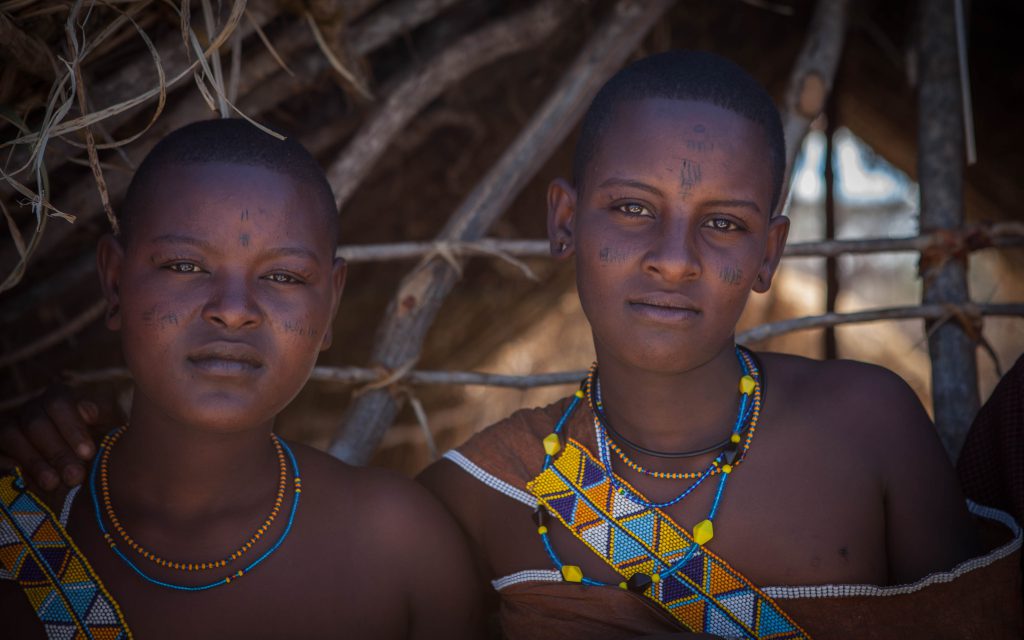
We walked for what felt like forever until we reached this collection of houses surrounded by a prickly bush used as a fence. I guess it was there to block the animals from coming in because that territory has many lions and hyenas. There were only a few people of the tribe in this arrangement of houses because they keep themselves separate from the others. The houses are roughly three-hundred meters away from each other. They do this so they don’t get their cows mixed up with their neighbours. This tribe was similar to the Masai tribe. They carry spears and sticks for fighting. The men wear a traditional plaid piece of cloth around their shoulders and on special occasions the women wear a cowhide dress that’s cut into strips and beaded with yellow, blue, and white. The houses were very interesting, similar to the ones in the other villages we visited but one of the houses had no walls, just a roof. It was crazy how remote the place was. All you can see is dry land and dead plants. The earth is so dry that it cracks the ground and can dry up entire rivers.



Richard showed the family a few sack garden techniques, which would hopefully provide them with their own homegrown vegetables in the future. Moshi’s intention was to ask if they wanted to host visitors in the region as part of his tours in the future as another way for them to earn money.
I thought that it was pretty funny that all of a sudden Moshi got a phone call. We were in the middle of nowhere and there was phone reception. Once we were done, we had to trek all the way back up to the car. I collected sand and seeds on the way back.
We left and headed back to Kondoa town to rest.
For the next week, Moshi, Zoe, Richard, Yastina, and I drifted in and out of villages with project ideas and plans for the future. It was fun but I was happy when we set off for our final destination, the village of Cheku. I’d soon be able to get a first-hand look at the well.


